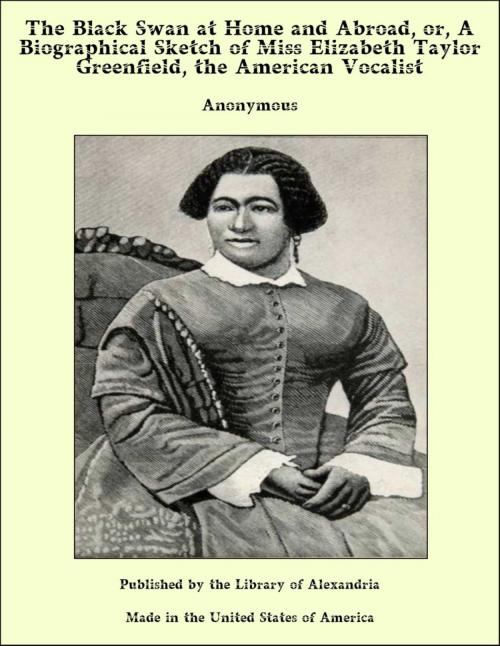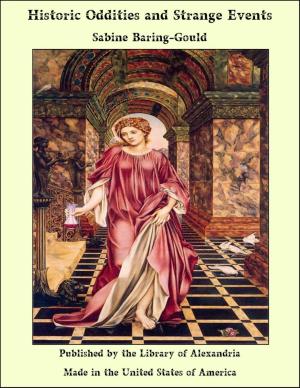The Black Swan at Home and Abroad, or, A Biographical Sketch of Miss Elizabeth Taylor Greenfield, the American Vocalist
Nonfiction, Religion & Spirituality, New Age, History, Fiction & Literature| Author: | Anonymous | ISBN: | 9781465540164 |
| Publisher: | Library of Alexandria | Publication: | March 8, 2015 |
| Imprint: | Language: | English |
| Author: | Anonymous |
| ISBN: | 9781465540164 |
| Publisher: | Library of Alexandria |
| Publication: | March 8, 2015 |
| Imprint: | |
| Language: | English |
Miss Elizabeth Taylor Greenfield, or the “Black Swan,” to adopt her musical agnomen, was born at Natchez, Mississippi. She was born in bondage. Her father was a full African; white and Indian blood flowed in her mother’s veins. When but one year old her mistress, Mrs. Elizabeth Greenfield, removed to Philadelphia, and joined the Society of Friends, manumitting the few slaves whom she had not previously accompanied and comfortably settled in Liberia. Several of these would not be separated from their beloved and venerated mistress, and among them her especial favourite, the gifted subject of these pages. In 1844 her mistress died, at the advanced age of nearly one hundred years, and in her will Elizabeth was remembered by a substantial legacy, sufficient to make her comfor for life; but the will was contested, and yet remains the subject of judicial investigation. Previous to the death of her mistress, Elizabeth had become distinguished in the limited circle in which she was known for her remarkable power of voice. Its tender and thrilling tones often lightened the weight of age in one who was to her beloved as a mother. How deeply she grieved that she could receive no culture from art. Neither the remarkable compass of her voice, nor the wonder of her high and low notes, nor the proffer of thirty dollars per quarter, when the standard price was ten, could induce a Professor to include her among his pupils. The admission of a coloured pupil would have jeopardized his success. By indomi perseverance she surmounted difficulties almost invincible. At first she taught herself crude accompaniments to her songs, and intuitively perceiving the agreement or disagreement of them, improvvisared and repeated, until there was heard floating upon the air a very “lovely song of one that had a pleasant voice, and could play well upon a”—guitar.
Miss Elizabeth Taylor Greenfield, or the “Black Swan,” to adopt her musical agnomen, was born at Natchez, Mississippi. She was born in bondage. Her father was a full African; white and Indian blood flowed in her mother’s veins. When but one year old her mistress, Mrs. Elizabeth Greenfield, removed to Philadelphia, and joined the Society of Friends, manumitting the few slaves whom she had not previously accompanied and comfortably settled in Liberia. Several of these would not be separated from their beloved and venerated mistress, and among them her especial favourite, the gifted subject of these pages. In 1844 her mistress died, at the advanced age of nearly one hundred years, and in her will Elizabeth was remembered by a substantial legacy, sufficient to make her comfor for life; but the will was contested, and yet remains the subject of judicial investigation. Previous to the death of her mistress, Elizabeth had become distinguished in the limited circle in which she was known for her remarkable power of voice. Its tender and thrilling tones often lightened the weight of age in one who was to her beloved as a mother. How deeply she grieved that she could receive no culture from art. Neither the remarkable compass of her voice, nor the wonder of her high and low notes, nor the proffer of thirty dollars per quarter, when the standard price was ten, could induce a Professor to include her among his pupils. The admission of a coloured pupil would have jeopardized his success. By indomi perseverance she surmounted difficulties almost invincible. At first she taught herself crude accompaniments to her songs, and intuitively perceiving the agreement or disagreement of them, improvvisared and repeated, until there was heard floating upon the air a very “lovely song of one that had a pleasant voice, and could play well upon a”—guitar.





![Cover of the book Rocky Mountain [Colorado] National Park by Anonymous](https://www.kuoky.com/images/2015/march/300x300/9781465508690-kJJ6_300x.jpg)









